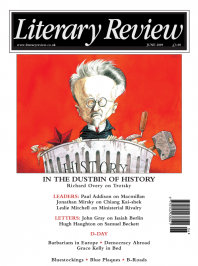Joanna Kavenna
Portraits of the Artists
How to Paint a Dead Man
By Sarah Hall
Faber & Faber 285pp £12.99
This is a novel based on four interwoven lives. In Italy in the early 1960s, Giorgio, a dying painter, contemplates the sacrifices and secret tragedies of his life. His promising pupil, Annette Tambroni, is going blind, yet continues to paint nonetheless. Thirty years later, an English artist, Peter Caldicutt, striding across the Cumbrian fells, falls badly and cannot move. He passes a Walpurgis Night out in the wildness, forced to confront his most disturbing memories. In the present day, Peter’s daughter, Susan, a photographer, struggles to cope with the death of her twin brother. Half-mad with grief, she hurls herself into a desperate affair with a colleague.
Hall supplies each of her characters with a distinctive narrative style: Giorgio’s is leisurely, epigrammatic; Peter’s is energetic and colloquial, even as he writhes on the mountainside (‘Is it a break? Crash injury or open fracture? Oh Christ, is it a partial fucking amputation?’). Susan’s portion is narrated

Sign Up to our newsletter
Receive free articles, highlights from the archive, news, details of prizes, and much more.@Lit_Review
Follow Literary Review on Twitter
Twitter Feed
It wasn’t until 1825 that Pepys’s diary became available for the first time. How it was eventually decrypted and published is a story of subterfuge and duplicity.
Kate Loveman tells the tale.
Kate Loveman - Publishing Pepys
Kate Loveman: Publishing Pepys
literaryreview.co.uk
Arthur Christopher Benson was a pillar of the Edwardian establishment. He was supremely well connected. As his newly published diaries reveal, he was also riotously indiscreet.
Piers Brendon compares Benson’s journals to others from the 20th century.
Piers Brendon - Land of Dopes & Tories
Piers Brendon: Land of Dopes & Tories - The Benson Diaries: Selections from the Diary of Arthur Christopher Benson by Eamon Duffy & Ronald Hyam (edd)
literaryreview.co.uk
Of the siblings Gwen and Augustus John, it is Augustus who has commanded most attention from collectors and connoisseurs.
Was he really the finer artist, asks Tanya Harrod, or is it time Gwen emerged from her brother’s shadow?
Tanya Harrod - Cut from the Same Canvas
Tanya Harrod: Cut from the Same Canvas - Artists, Siblings, Visionaries: The Lives and Loves of Gwen and Augustus John by Judith Mackrell
literaryreview.co.uk